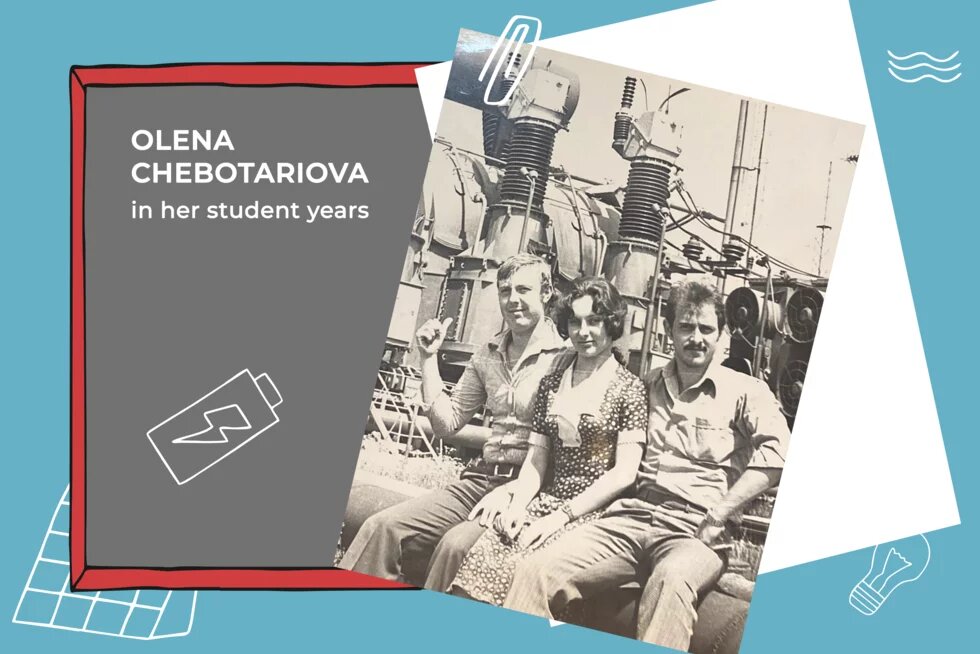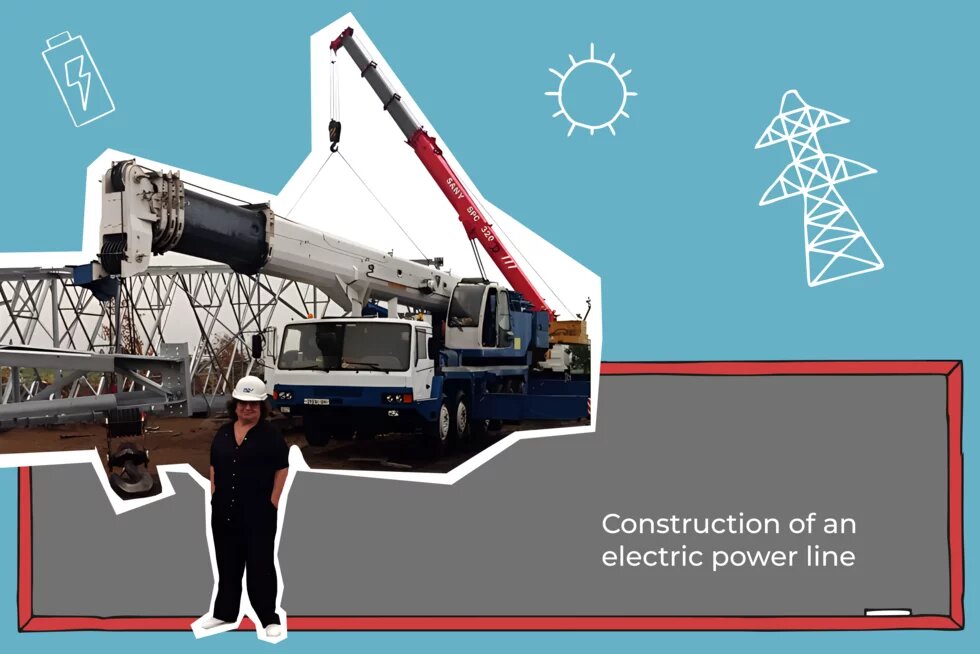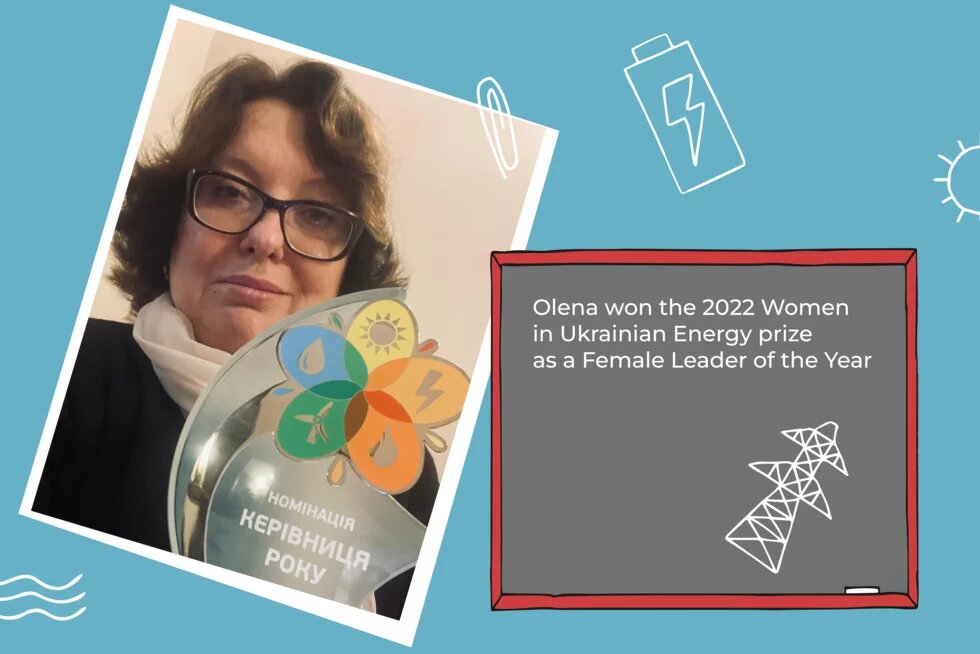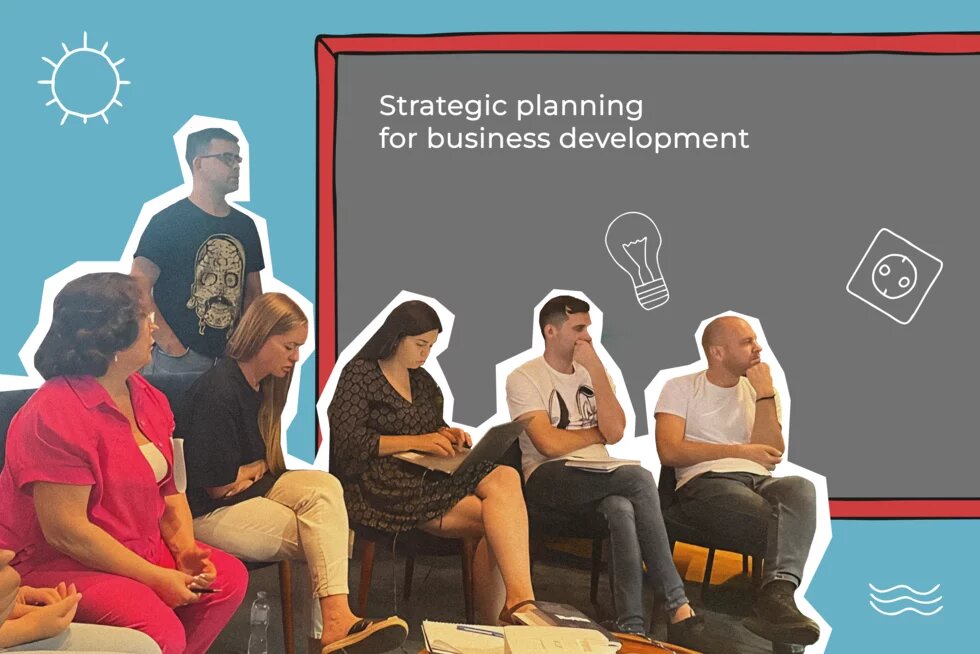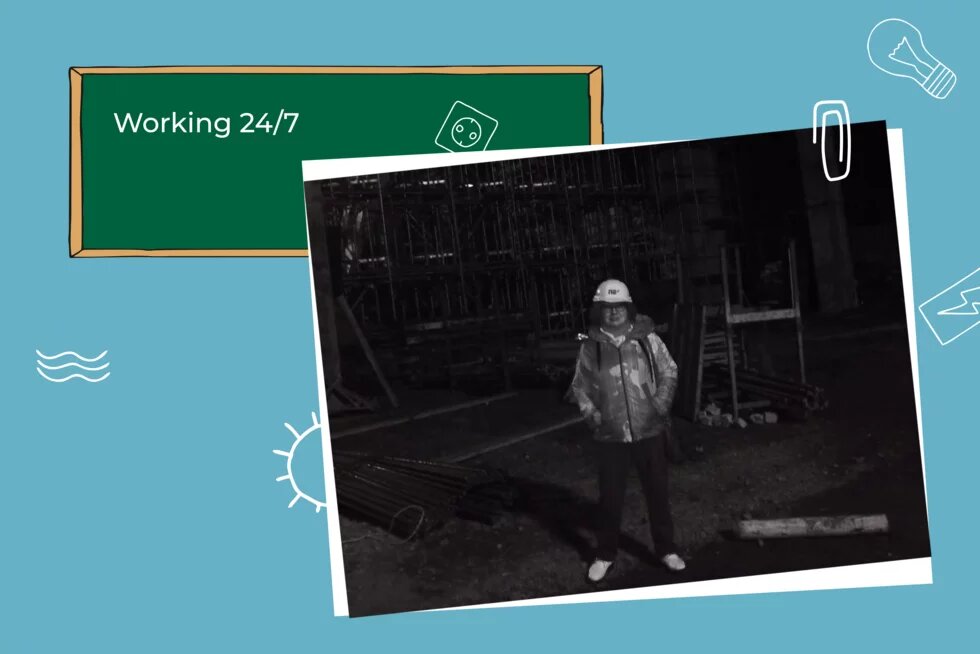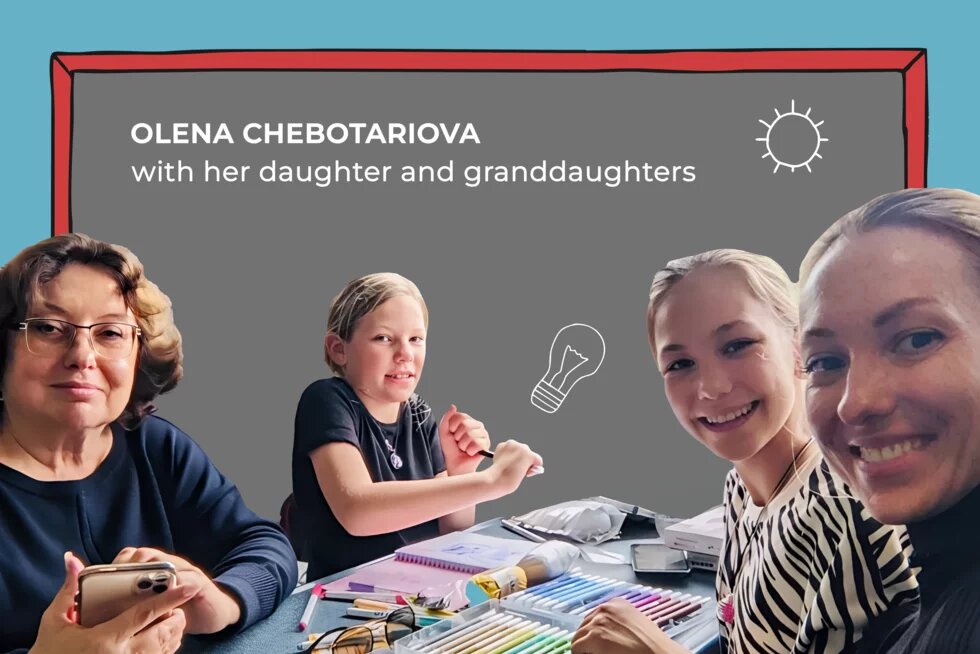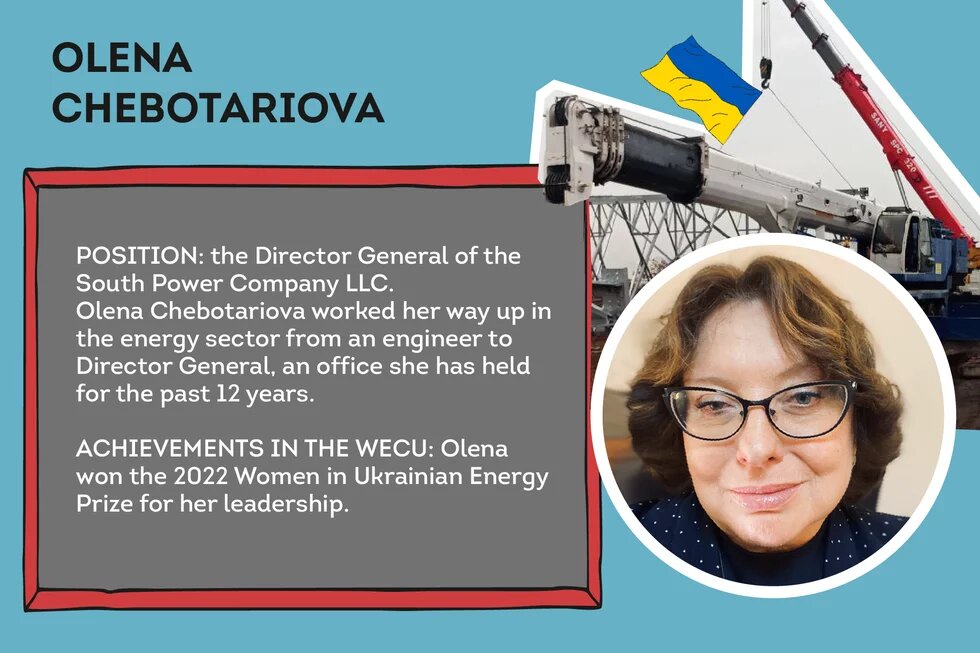
Together with our partners NGO Women’s Energy Club of Ukraine we are happy and proud to share the story of Olena Chebotariova who are defeating the stereotypes in profession and making better Ukrainian energy sector.
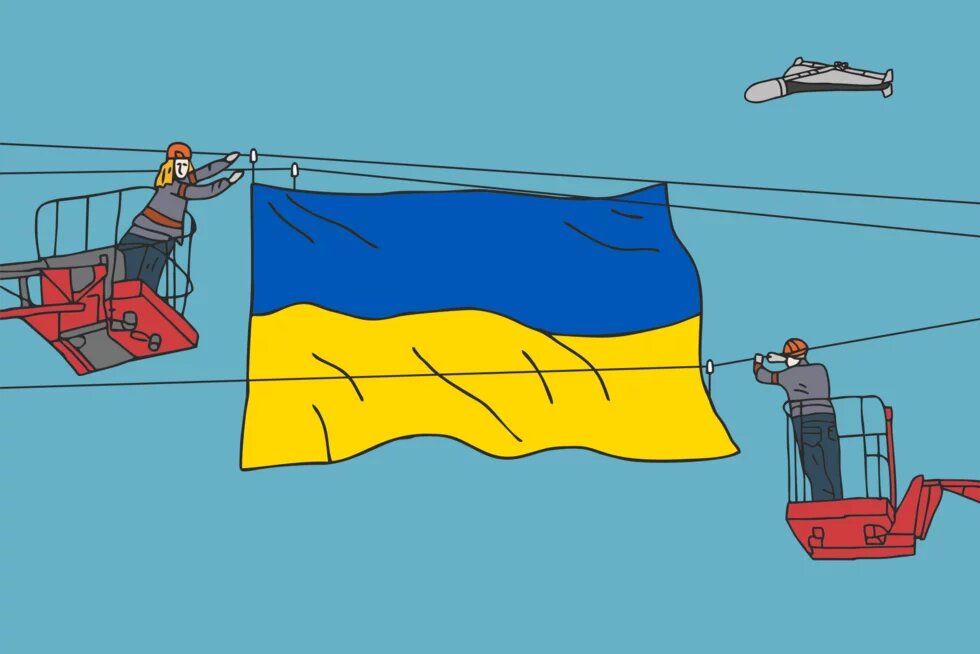
Olena Chebotariova has spent 40 years working in the energy sector. Having started as an engineer at the South Power Company, she gradually rose up the ranks to become its Director General and continues working in the field even during this turbulent time for the country. What helps her stay grounded, and how does she manage to overcome challenges and gender-based stereotypes? Let’s find out in our interview with her.
Olena, can you please share your story? What was your reasoning for choosing the energy sector, and what ignited your interest in the field?
After I graduated from school, I was hired as a receptionist for the Office of the Director of the Design Institute, a facility responsible for designing electrical substations and power transmission lines. That job offered me a wonderful opportunity to observe engineers and designers at work, which made me curious. So, a year later, I enrolled in the Energy Faculty of the Polytechnic Institute. Five years later, I returned to my first employer as an engineer and embarked on project work myself.
As a young lady, I found this profession both exciting and romantic because my projects were used to build electric power lines, thus bringing light into people’s lives!
Later, after the Soviet Union collapsed and numerous private enterprises sprung up like mushrooms, I was invited to work for one such company. Twenty-seven years later, I still work for that company. Having started as an engineer, I gradually rose up in the ranks and was promoted to a leadership role. I believe that working in the energy sector is my calling.
How long have you been working in this field overall?
Almost 40 years, if you mean my entire career.
Has your perception of your job shifted over the years, or do you still find a hint of romance in it?
I guess there’s still a hint of romance, after all, I did fall in love with the profession. This is my entire life; it has become family to me. My late husband, whom I sadly lost a while ago, also had worked in this field, while I kept going. I’ve been through highs and lows, and sometimes the competition was really fierce… Still, if you love your job, every hardship is but a minor distraction. You just keep doing what you love doing.
Speaking of hardships — what were they, and how did you manage?
Having started as an engineer, I was later promoted to department manager, then Head of Sales, and then Director General. Each stage presented its own set of hardships and challenges; however, I could always rely on my colleagues and my family for support. I guess that’s what ultimately helped me to keep going.
With the energy sector traditionally perceived as a male-dominated field, were gender-based stereotypes part of those challenges?
Of course, I did have to deal with those stereotypes from time to time. However, I chose to focus on the advantages of being a woman. For instance, I used the attention women get to my advantage. I believe in the importance of staying professional no matter what. With that attitude, all the stereotypes tend to fade over time.
Do you think combatting gender-based stereotypes will increase the share of female workers in your field?
Indeed, we can see more and more women working in the energy sector. This is all part of modern change. More and more women choose professions previously considered ‘men’s jobs’, and one example is truckers. I think people will get used to seeing women in different capacities. As a society, we have no other choice, given the situation we’re living in.
You won the Female Leader of the Year Award at the Ukrainian Energy prize held by the Women’s Energy Club of Ukraine (WECU). What role do you think such awards play in unlocking women’s potential in the industry?
I was nominated by my team, without me knowing, so winning the award was a pleasant surprise. I believe the greatest value of such awards is that they make women working in energy, which is a very important field, more visible, and raise awareness of the challenges women face in their careers. I was happy to learn about all the other women working in the energy sector and related fields: educators, journalists, and many others.
Let’s talk about your role as a leader. What qualities do you think a female leader should have, and are they different from those of a male leader?
To be honest, I view leadership regardless of the leader’s gender and believe it’s all about what kind of a person you are and your relations with colleagues and subordinates. This is what matters in one’s leadership style.
In that case, what are the traits that define a successful leader, male or female?
I guess my approach may be a bit different from that of a stereotypical manager. For instance, I don’t believe in ruling with an ‘iron fist’, I try to talk to people more and do my best to understand them. I guess that has something to do with me working for my current employer for 27 years now, with my past 12 years spent as a Director General.
Of course, there are times when you need to be assertive about your decisions so that people understand that everyone has to do their job. Still, I tend to be a more understanding type, prone to leaning on mutual support and maybe even empathy. I find it important to understand the reasons behind one’s actions.
Do your male subordinates have any problems with recognizing you, a woman, as their superior? Did you face any challenges because of that?
I did, of course, notice some doubts in the beginning, as if my male colleagues thought, ‘What does a woman have to do in the energy sector?’ However, as you keep working and have results to show, their opinions tend to change. I mean, some may hold onto their prejudice in their hearts, however, we are result-oriented here, so the results are the only thing that matters.
What do you think was the greatest challenge of your entire career?
The greatest challenge is working for the same company for 27 years. This is a private enterprise where I’m currently employed as a Director General. It is important for me to keep working in the field that I love and understand and stay afloat even in such turbulent times. I know many Ukrainian directors personally, and we keep in touch even if we are competitors, and this is a value in itself, to be working in the field where there is a place for both competition and understanding.
Can you please share how the full-scale war affected your work in the energy sector and what challenges you believe are linked to it?
Today, as we are working hard to rebuild the energy infrastructure, our work is more dangerous than ever. As a leader, I am very worried about my people having to work in these tough circumstances, sometimes in dangerous facilities. In the East of Ukraine, we often found ourselves in a situation where our staff had to walk the minefields to restore the power supply to communities. This is very hard and very dangerous. However, when we do manage to restore the power supply, under rocket missile and UAV attacks, the feeling is incredible — like you’re doing a job of utmost importance for the nation, defending a frontline on your own. You feel like a lightbringer.
Working in wartime is quite stressful. What helps you recover? Any secrets you can share?
My method of recovery is staying in touch with my kids. My daughter and granddaughters are abroad now, attending school and living a peaceful life. When we call each other in the evening, they tell me about their day, their achievements, their schoolwork and their job, and it gives me peace of mind knowing they can live a normal life, with no air raid sirens blaring. Their happiness is my recovery.
Tell us a bit about your home life. Do you have any traits that you never show at work?
I guess I do. I love to cook and host guests, preparing tables for my family. This gives me a homey feeling, even in this tough time. My daughter is an architect and designer, and, I, too, love making my home a beautiful space. However, we work 24/7, so my family is used to me being distracted by work-related matters at any time. They know that as their mother is working, the energy infrastructure is being recovered.
What do you consider your greatest achievement in life?
I guess the fact that I stayed here and kept doing my job in a leading role. This is my professional achievement because staying in the country and doing my job are important to me. If we talk about the private sphere, I guess my greatest achievement is my family. My daughter and granddaughters are, I guess, my most important achievement and my future.
What helps you stay in the country and keep doing your job despite all the challenges?
I guess it’s my faith in the future. I firmly believe that we have a future, and this belief is empowering. If you mean personal traits, then surely it’s diligence and patience. No matter how hard life becomes, you must get your act together and keep on going, never give up, and carry on.
Are there any women that inspire you — perhaps someone from your industry, or your social circle?
I did have such women in my life, but sadly, they are no longer with us. The first one was Olena Linnyk, who worked as the Director of the Kharkiv Institute for Power Engineering Design. She dedicated her entire life to her job, to the point that she didn’t even have a family on her own. She was my standard for dedication and sense of purpose.
Another one was Tetiana Neboha who worked as a manager at one of the departments of the Zaporizhzhia NPP [Nuclear Power Plant – Editor]. She, too, was a true professional and greatly inspired me.
And, of course, Yevheniia Linkun, a woman that I used to work with when I was young. She worked in relay protection and controls and was a real expert in her field. To this day, Yevheniia is my fine example of a strong and professional woman.
What would you like to tell the young women who are just starting their careers and who may be inspired by your story? Any practical advice or words of inspiration?
My first and utmost advice would be to get to understand the field you’re working in, which is even more crucial in the energy sector. If you want to climb the ladder and get promoted to a leadership role one day, you need to know the basics of your profession and the specifics of every job involved — how can your subordinates take a leader seriously when that leader doesn’t know what they are talking about? As a leader, you need to not just give tasks to others, but be an expert with whom one can discuss their professional issues.
In addition to being knowledgeable, character and hard work are key to success. And, of course, you have to love your job. Understanding and loving your job gives you patience, which is absolutely necessary when aiming for the top.
Background
Olena Chebotariova is the Director General of the South Power Company LLC, one of the leaders in the energy market when it comes to building and finishing work, electric equipment engineering and supplies, technical audits for enterprises, and feasibility studies. In wartime, the company’s employees provide strategically important services for the nation, as they do emergency repairs at energy infrastructure facilities, specifically in the regions affected by the ongoing hostilities.
Olena Chebotariova worked her way up in the energy sector from an engineer to Director General, an office she has held for the past 12 years, successfully managing a team of 120 specialists, with 82.5% of her subordinates being male.
Under her leadership, the company was named a Top 10 company in constructing and reconstructing electric power facilities.
Olena won the 2022 Women in Ukrainian Energy Prize for her leadership. The awards have been held since 2019 by the Women’s Energy Club of Ukraine (WECU) under the auspices of the Kyiv (Ukraine) office of the Heinrich Böll Foundation.
The NGO Women’s Energy Club of Ukraine (WECU) is an independent professional association of women working in the energy sector, and participation is voluntary.
The club unites over 200 female members, including female experts on energy, female advocates from both national and international organisations working on reforming Ukraine’s energy sector, female envoys of businesses and NGOs, female MPs, and women simply interested in just and sustainable development of Ukraine’s energy sector.
The annual Women in Ukrainian Energy Award was initiated by the NGO Women’s Energy Club of Ukraine (WECU) in 2019.
The purpose of this competition is to recognise the important roles that women play in developing the Ukrainian energy sector, supporting them, and motivating them to further advancements in the field and related sectors, recognising the competitors’ contribution to establishing gender equality in the energy sector, vocational training, research, and specialised journalism.
Categories for the contest are determined annually. Through the years, they have included Company of the Year, Female Boss of the Year, Female Worker of the Year, Female Journalist of the Year, Female Educator of the Year, Female Leader on Decarbonisation, Female Politician, Female Volunteer, and Female Lawyer.
The competition is held under the auspices of the Kyiv (Ukraine) office of the Heinrich Böll Foundation.
Further reading on women employed in the energy sector:
-
2018-2019 research Women in Ukraine’s Energy Sector (in Ukrainian)
-
2023 research Women’s Role in Ukraine’s Energy Sector in Times of War: Towards Stability and Equality
